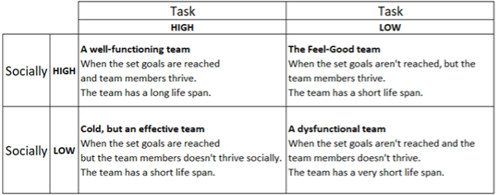How do we get better cooperation in our team?
A puzzle where a piece is missing. A shoe that leaves a mark. A chain is only as strong as its weakest link.
There are many metaphors describing something that is not quite as it should be. It's the same with a team. Each individual can be perfect for the company on paper, but when they join a team, there might be something that doesn't work. How would you find out what’s wrong? And more importantly - what do you know about it?
How Does the Team Work?
When you start off by evaluating a team and look into the dynamics of the group, the model concerning team cooperation by Michael Wests could be a good place to start, even for the team members themselves, who get the tools to look into the cooperation in the team.
In Michael West's book "Teamwork - Methods for effective cooperation" he establishes 3 main components for team efficiency – (see the figure below):
- The task efficiency is the degree to which the team is successful in achieving its task-related goals.
- The social well-being refers to the team members' success, growth and development.
- The team's viability is the likelihood that the group will continue to work and function effectively.
When Michael West puts those 3 components together and into a model, they look like this:

Awareness Is the First Step
Why are there some employees who function well in one department but not in another? It's all about looking at the composition of a team. I'm often helping other companies testing and analyzing the different personalities in a team. We get a clear idea about the individual employees’ strength and what motivates, but also where the weaknesses of the team lies.
We have to focus on making the members of the team conscious about their individual type of personality and why they react the way they do. But one thing is to be conscious about the behavioral patterns of the team which is what creates the dynamic, another is changing bad habits.
The first step is getting the tools to change your old habits. This is where you'll learn about manageable parts of your personality in cooperation with your colleagues, for the benefit of the entire team. Secondly, a crucial and sometimes overlooked step - training and follow ups.
Old Habits Die Hard
It can be really difficult to acquire new habits and ways to interact with others. It requires both will and persistence. Just think how hard it would be to start brushing your teeth on the other side of the mouth, than you usually do. Try it, and you will quickly find out that you fall back quickly into your old habits, unless you give it your full attention for a period of time until the new habits become habitual habits.
Therefore, one of my biggest focus areas, is on training and the follow-up in a team since the analysis is essential, for the whole exercise. Identifying the problems has no value unless you change the behavior. Follow-up can also be the motivation that means that you maintain changed habits and do not fall back into the old routines and ways of cooperating.
In the follow-up, we identify criteria for what we want the output of the analysis to be, so we get something measurable. Are there, for example, collaboration difficulties in the team? Then the various members of the team can each tell what they think a good cooperation entail.
Secondly, we look at how the process should move forward. We identify sub-goals to be met and more importantly how and when to do it. This way we can continuously analyze and see if the team has moved in the right direction. The fact that we continuously measure progress, is in itself a motivation for change. Small changes make great changes in the long run! And it is when we break old habits, good or bad, that we get a new insight and a new perspective.


